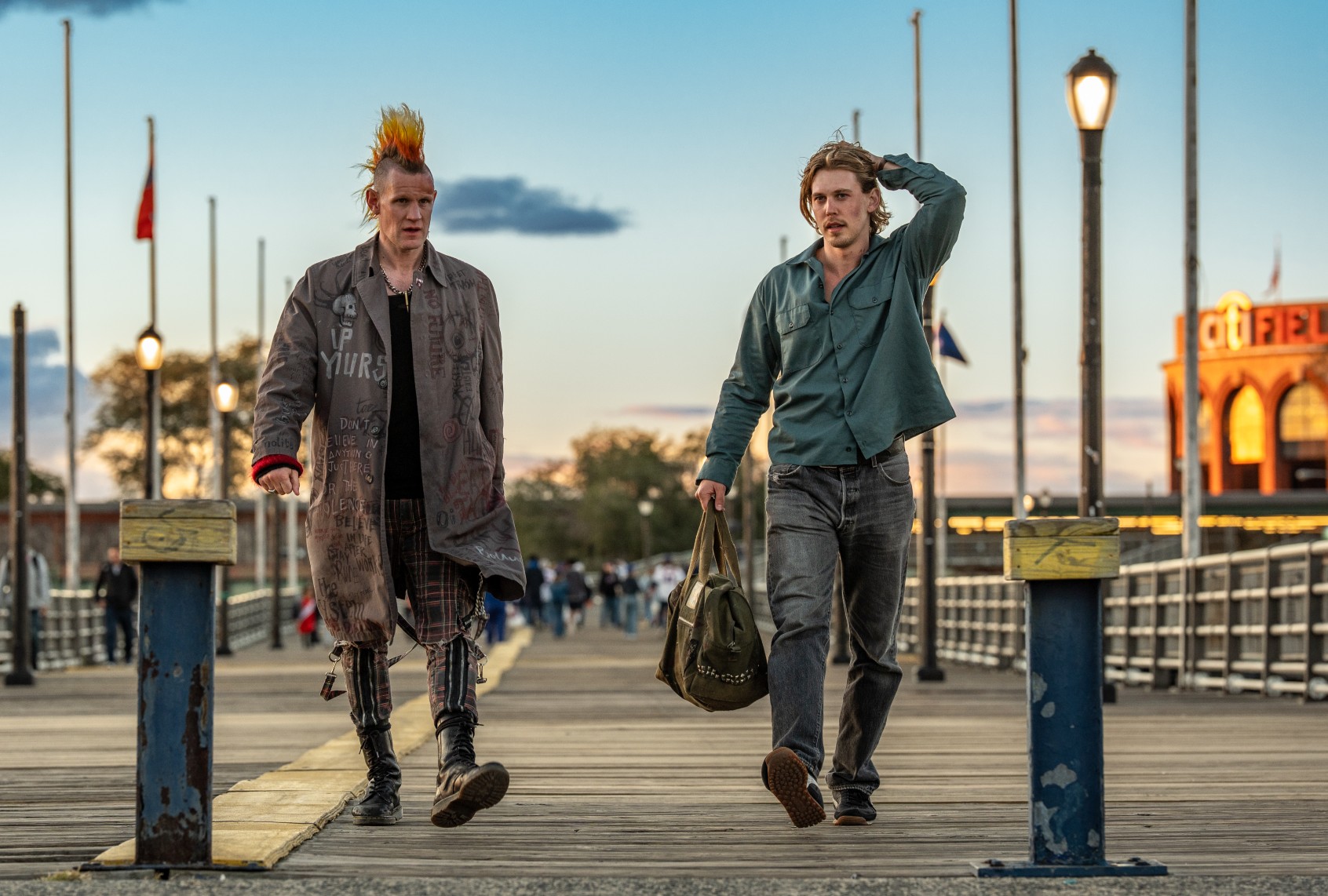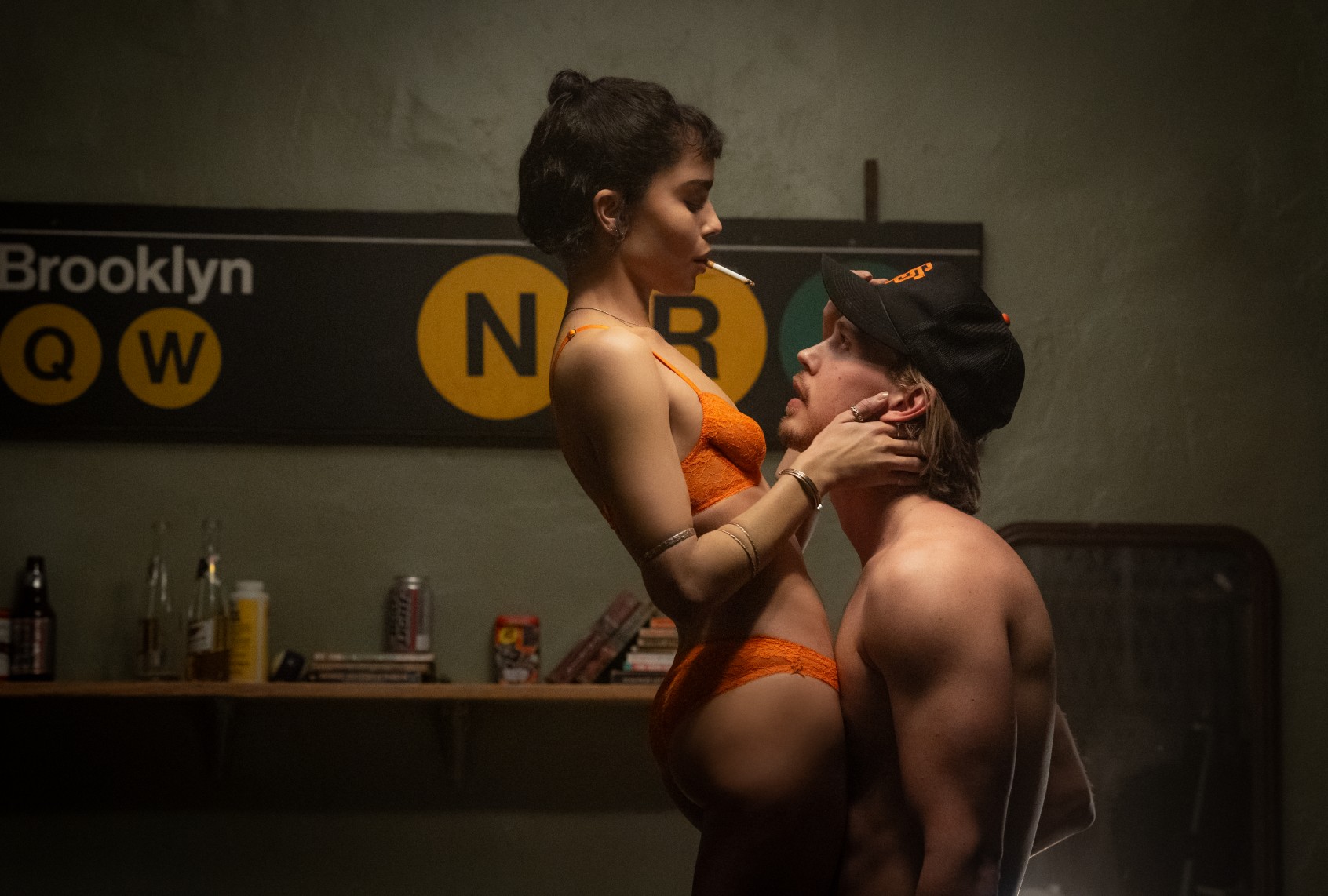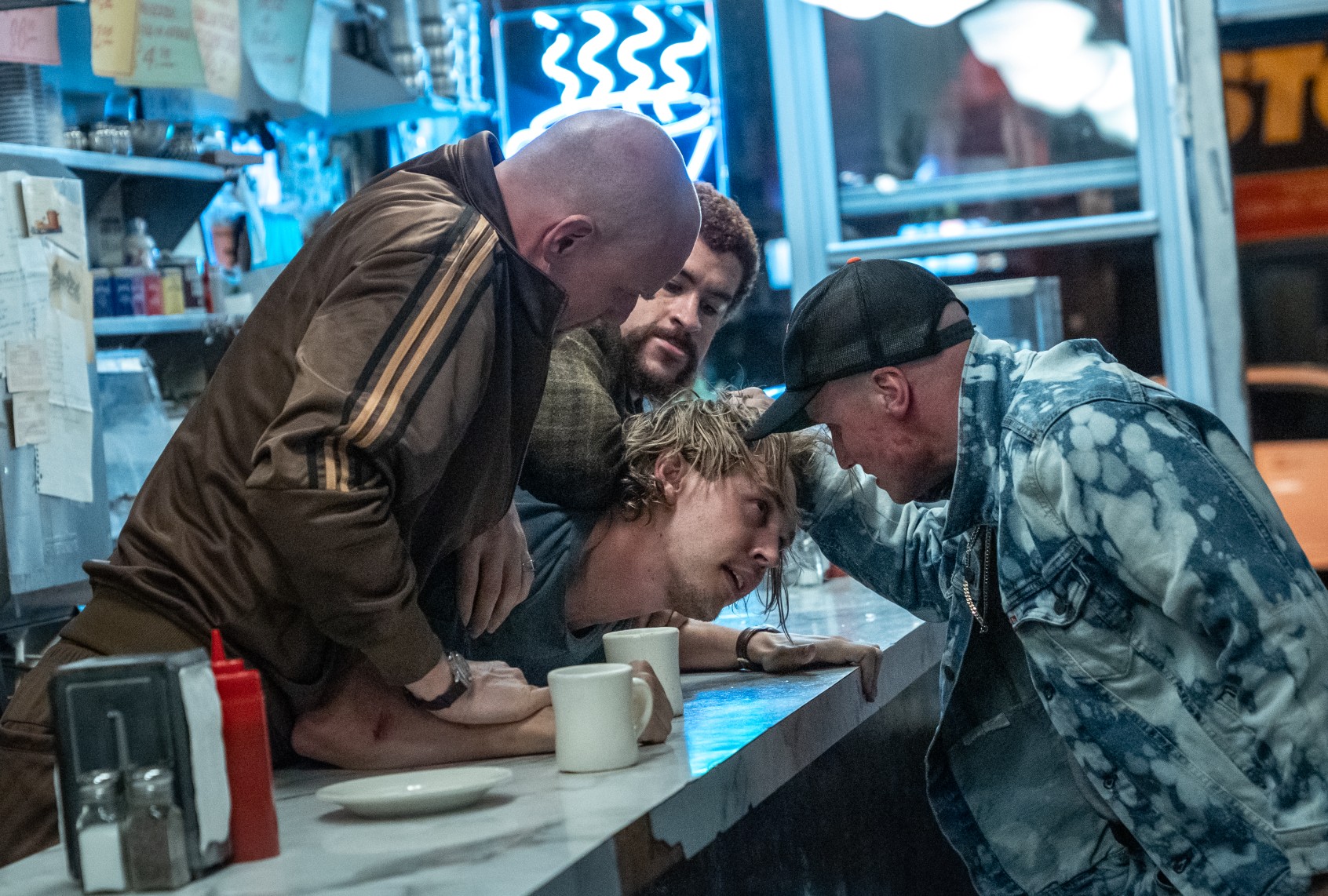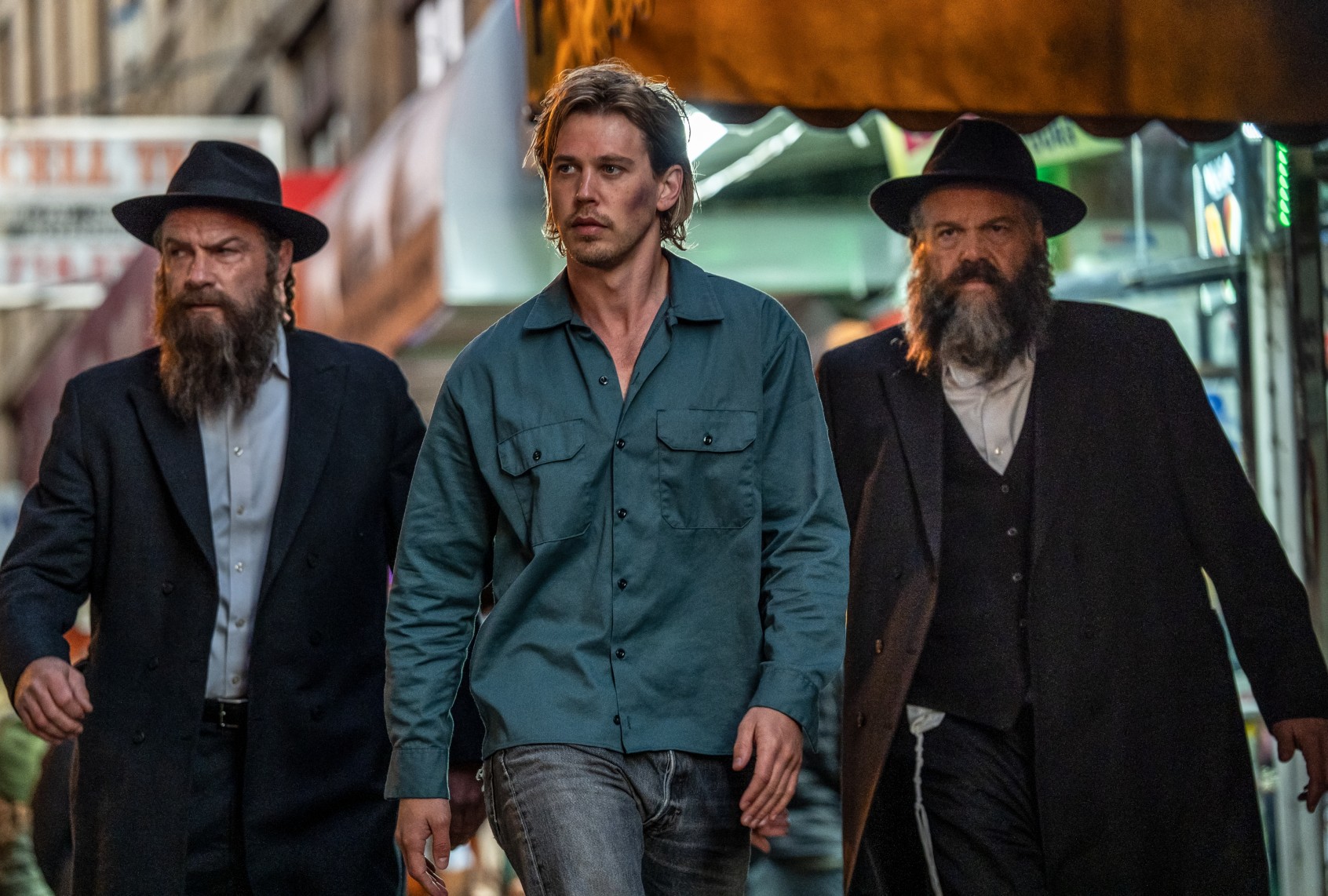We have not been conditioned to have fun during a Darren Aronofsky movie — or, at least, not the traditional kind of fun. No one would describe watching the handful of addicts in “Requiem for a Dream” descend to a new circle of unimaginable, dopesick Hell as a “romp.” Even a film like “Black Swan,” which lives at the center of the Venn diagram between madness and camp, doesn’t go down easily. (Let’s just say it was a quiet car ride home after I dragged my mom, dad and sister to the theater with me on opening night when I was 15, convincing them it would be a holiday movie event for the whole family.) No, no, an Aronofsky film promises to be interesting, but not optimistic; memorable, not mirthful. And, certainly, an Aronofsky film never, ever promises to be good. Check the expectation of quality at the theater door.
Imagine the shock, then, when I found myself grinning ear to ear during the final act of Aronofsky’s latest, “Caught Stealing,” a rollicking lark through New York City’s semi-gentrified Lower East Side circa 1998, based on Charlie Huston’s 2005 novel of the same name. For a director who has revolted against conventional fun for his entire career, “Caught Stealing” finds Aronofsky practically living it up, as if he were a retirement community resident who broke free from the group during a field trip to the oatmeal museum. While the last half-hour is wall-to-wall, madcap action, the entire film is such a refreshing change of pace and tone from Aronofsky’s typically dour material that it feels like the director is intentionally turning a page. And, overt as he is, Aronofsky makes a big show of it too: clearing his throat, licking the tip of his finger and flipping that page with enough force for the audience to hear the paper crinkle.

(Niko Tavernise/Sony Pictures) Russ (Matt Smith) and Hank (Austin Butler) in “Caught Stealing”
Unlike the fear or false certainty Aronofsky usually produces in his actors’ faces — emotions he loves to revel in until they become almost unbearable — Butler maintains visible conviction. In shifting away from his regular sentiments, Aronofsky abandons the familiar. Hank is a mirror, reflecting the filmmaker’s evolution toward something new and hopeful.
But don’t be mistaken. “Caught Stealing” is merely a new chapter for Aronofsky, not a new story altogether, and as such, the themes are the same. There is plenty of cold-hearted, merciless darkness, compulsive behavior and, of course, ill-fated love of all kinds. It wouldn’t be an Aronofsky film if his characters weren’t damned from the start, forced to spend the movie’s runtime seeking absolution wherever they can get it. Aronofsky has long had an obsession with doomed characters, people who endure great, unimaginable strife — in the case of 2014’s “Noah” and 2017’s “Mother!”, to biblical proportions. If his tormented characters don’t die by the film’s end, any freedom or peace they’re allowed comes at a price just as steep. But with “Caught Stealing,” Aronofsky confronts his most notorious trope and does something radical, giving his charming lead a well-deserved happy ending, even if it’s not entirely cost-free. A customarily bleak Aronofsky movie would be all too appropriate for this era, when doom has never felt more pervasive. But with “Caught Stealing” swinging in the opposite tonal direction at such a pivotal time, Aronofsky reminds us that hope is wherever we find it, and it can even be a hell of a lot of fun looking.
Unfortunately for Hank (Austin Butler), a bartender who finds himself embroiled in a puzzling mix-up with the Russian mafia after his drug-dealing neighbor Russ (Matt Smith) skips town for a bit, amusement is not on the menu. Once an up-and-coming baseball wunderkind, Hank is now content watching his beloved San Francisco Giants play from across the country while he makes a modest name for himself among the bar patrons. But though Hank has put thousands of miles between himself and his broken dream, he remains haunted by the car crash that killed his best friend and ended his baseball career. The nightmares are rare but intense, best dulled with booze and sex with his girlfriend, Yvonne (Zoë Kravitz).
But when Russian mobsters Aleksi (Yuri Kolokonikov) and Pavel (Nikita Kukushkin) and their Puerto Rican associate Colorado (Bad Bunny, credited by his full name, Benito Martínez Ocasio) show up in search of some unnamed object Hank doesn’t have, his simple life picks up speed, and fast. Upon their violent first meeting, Hank loses a kidney, and soon after, is faced with a series of decisions that will define who he is forevermore.

(Niko Tavernise/Sony Pictures) Yvonne (Zoë Kravitz) and Hank (Austin Butler) in “Caught Stealing”
As with so many of his lead characters — Brendan Fraser’s Charlie in “The Whale,” Mickey Rourke’s Randy in “The Wrestler,” Ellen Burstyn’s Sara in “Requiem for a Dream” — Hank is eventually backed into a choice between his compulsions and the people he cares about. Down one kidney, he’s forced to give up drinking cold turkey, but it’s not as easy as he suspects it’ll be. Two more unsavory characters, lethal Hasidic brothers Schmully (Vincent D’Onofrio) and Lipa (Liev Schreiber), and a narcotics detective (Regina King) snooping around Hank’s building don’t make wrestling with substance dependence any easier. But as Yvonne tells Hank after bringing him home from the hospital, “I want to know that you’re someone who can handle his sh*t.”
Start your day with essential news from Salon.
Sign up for our free morning newsletter, Crash Course.
Presented against the archetypal Aronofsky character, Hank exists in stark contrast. When faced with a challenge, even his stumbles point him in the right direction. He rises to the challenge, and Aronofsky is far more interested in the ways that Hank finds to succeed and outwit his opponents than he is in watching the character spiral, trying to come up with a way out of his predicament. There is, at all times, a prominent undercurrent of confidence that keeps “Caught Stealing” humming in neutral, ready to rev its engines and blast off again. Granted, Huston adapted the film’s screenplay himself, but there’s no denying how snugly the movie fits into its director’s oeuvre, even though Aronofsky didn’t pen the script. He follows Hank closely, framing him tight, always looking for the realism that the director is so known for demanding from his actors. But unlike the fear or false certainty Aronofsky usually produces in his actors’ faces — emotions he loves to revel in until they become almost unbearable — Butler maintains visible conviction. In shifting away from his regular sentiments, Aronofsky abandons the familiar. Hank is a mirror, reflecting the filmmaker’s evolution toward something new and hopeful.

(Niko Tavernise/Sony Pictures) Pavel (Nikita Kukushkin), Colorado (Bad Bunny) and Aleksei (Yuri Kolokolnikov) rough up Hank (Austin Butler) in “Caught Stealing”
When you force someone who is easy to root for through 1,000 impossible situations and let them come out on the other side unscathed, the viewer starts to believe they can root for themselves, too.
For Butler’s part, Aronofsky could not have selected a better mirror. As someone young enough to have witnessed Butler’s emergent days as a Nickelodeon and Disney Channel teen heartthrob firsthand, I’ll admit that I never quite understood the appeal. Maybe time had to work its magic to find a place where the baby face ended and the smolder began; they could not exist as one, though he certainly gave it the college try. In “Caught Stealing,” however, there is no denying Butler’s sheer magnetism. Yes, the heart-shaped lips and resting pout do some heavy lifting to pull off the baseball-loving mama’s boy, but Butler’s authenticity is irrefutable. He exudes charm with every gaze, and there isn’t one single line of dialogue that feels out of place or implausible. He feels so natural in front of the camera that “Caught Stealing” almost seems like a star reborn, despite Butler’s star being relatively fresh from the obstetrics unit as it is.
But Butler works best here because you can’t doom someone this endearing. Aronofsky’s tragic characters are often likable, but rarely will a riot break out when they meet their inevitable demise. In Butler, Aronofsky finds the ideal match for his newly tapped hopefulness, someone who doesn’t just exude a classic simplicity that fits the film’s 1998 timeline, but represents the kind of ease so many people long to return to in a time when nothing feels like it will ever be easy again. He is, simply put, extremely easy to root for. And when you force someone who is easy to root for through 1,000 impossible situations and let them come out on the other side unscathed — well, minus a kidney and with a lot of bruising and trauma — the viewer starts to believe they can root for themselves, too. Unlike all those other Aronofsky characters, who must annihilate themselves in search of absolution or perfection, Hank will probably be okay.
Aronofsky’s directorial vision is uncompromising and brutal. Even when his films miss their mark, his willingness to depict the hilt of the human experience results in films packed to the brim with bold artistic decisions in a time when safety is the flavor du jour. But, as it turns out, hope can be a bold artistic decision, too, and in “Caught Stealing,” Aronofsky tests his ability to remain optimistic without losing his distinct individual touch.
Just after she tells Hank that she wants to be with a man who can handle his sh*t, Yvonne adds, “If you run away from what you’re afraid of, then it owns you.” One could say the same about Aronofsky, whose filmography has been so dominated by despair and dread. Until now, he’s avoided the side of humanity that’s lighter, more sanguine and less condemned. Sometimes, it just takes living long enough and wading through all of humankind’s muck to remember that there’s a place for hope among all of the wreckage, even if it’s hard to find. The search takes a lot of energy. It would be easier to give up, to admit defeat and give everyone — the Russians, the Puerto Rican, the Hasids, your moviegoing audience — what they want, and stay centered in misery. Or, you can pick up a bat, smash those expectations to pieces, and handle your sh*t.
Read more
about recent theatrical releases


